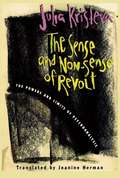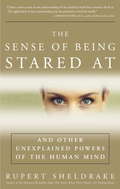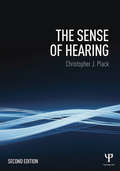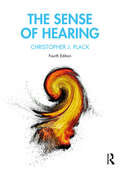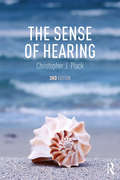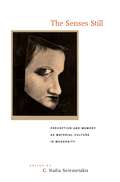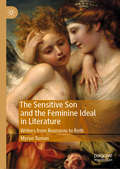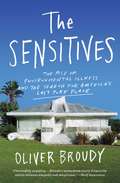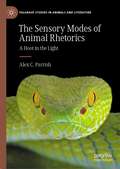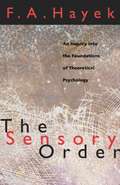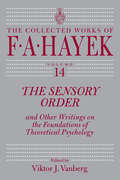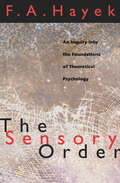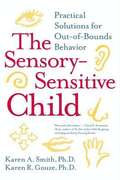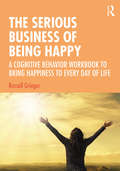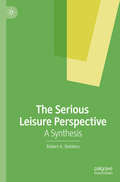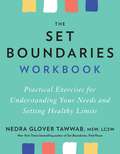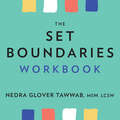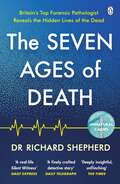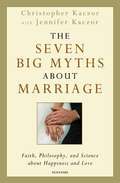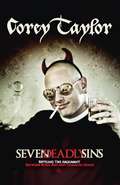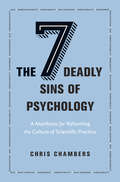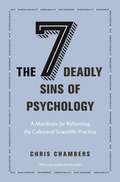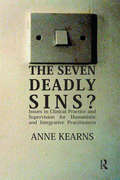- Table View
- List View
The Sense and Non-Sense of Revolt: The Powers and Limits of Psychoanalysis (European Perspectives: A Series in Social Thought and Cultural Criticism)
by Julia KristevaLinguist, psychoanalyst, and cultural theorist, Julia Kristeva is one of the most influential and prolific thinkers of our time. Her writings have broken new ground in the study of the self, the mind, and the ways in which we communicate through language. Her work is unique in that it skillfully brings together psychoanalytic theory and clinical practice, literature, linguistics, and philosophy.In her latest book on the powers and limits of psychoanalysis, Kristeva focuses on an intriguing new dilemma. Freud and psychoanalysis taught us that rebellion is what guarantees our independence and our creative abilities. But in our contemporary "entertainment" culture, is rebellion still a viable option? Is it still possible to build and embrace a counterculture? For whom—and against what—and under what forms?Kristeva illustrates the advances and impasses of rebel culture through the experiences of three twentieth-century writers: the existentialist John Paul Sartre, the surrealist Louis Aragon, and the theorist Roland Barthes. For Kristeva the rebellions championed by these figures—especially the political and seemingly dogmatic political commitments of Aragon and Sartre—strike the post-Cold War reader with a mixture of fascination and rejection. These theorists, according to Kristeva, are involved in a revolution against accepted notions of identity—of one's relation to others. Kristeva places their accomplishments in the context of other revolutionary movements in art, literature, and politics. The book also offers an illuminating discussion of Freud's groundbreaking work on rebellion, focusing on the symbolic function of patricide in his Totem and Taboo and discussing his often neglected vision of language, and underscoring its complex connection to the revolutionary drive.
The Sense of Being Stared At
by Rupert SheldrakeMost of us know it well--the almost physical sensation that we are the object of someone's attention. Is the feeling all in our heads? What about related phenomena, such as telepathy and premonitions? Are they merely subjective beliefs? In The Sense of Being Stared At, renowned biologist Rupert Sheldrake explores the intricacies of the mind and discovers that our perceptive abilities are stronger than most of us could have imagined. Sheldrake argues persuasively in this compelling book that such phenomena are, in fact, real. He rejects the label of "paranormal" and shows how these psychic occurrences are in fact a normal part of human nature. Combining the tradition of pragmatic experimentation with a refusal to accept the conventional answers to explain such phenomena, Sheldrake pioneers an intriguing new inquiry into the mysteries of our deepest nature. Rigorously researched yet completely accessible, this groundbreaking book provides a refreshing new way of thinking about ourselves and our relationships with other people, animals, and the world around us. (From the Trade Paperback edition.)
The Sense of Hearing
by Christopher J. PlackThe Sense of Hearing is a truly accessible introduction to auditory perception that is intended for students approaching the subject for the first time, and as a foundation for more advanced study. The second edition has been thoroughly revised throughout, and included new chapters on music, hearing impairment, and a new appendix describing research methodologies. In clear and authoritative prose, the fundamental aspects of hearing are addressed. The reader is introduced to the nature of sound and the spectrum, and the anatomy and physiology of the auditory system. Basic auditory processes including frequency selectivity, loudness and pitch perception, temporal resolution, and sound localization are explained. The reader is led to an understanding of the remarkable abilities of the auditory system in a systematic and coherent way. In subsequent chapters, it is shown how complex processes, such as perceptual organization, speech perception, and music perception, are dependent on the initial analysis that occurs when sounds enter the ear. Finally, a chapter on hearing impairment provides an introduction to disorders of the auditory system.The text benefits from 162 original illustrations, including uncluttered diagrams that illuminate auditory mechanisms. An extensive glossary provides definitions of technical terms. The emphasis is on explanation and clarity of style throughout, making The Sense of Hearing an essential resource for students and educators involved in this sometimes challenging field.
The Sense of Hearing
by Christopher J. PlackThe Sense of Hearing is a highly accessible introduction to auditory perception, addressing the fundamental aspects of hearing. This fourth edition has been revised to include up-to-date research and references. In particular, Chapter 7 on Pitch and Periodicity Coding and Chapter 13 on Hearing Loss include new material to reflect the fast pace of research in these areas. The book introduces the nature of sound and the spectrum, and the anatomy and physiology of the auditory system, before discussing basic auditory processes such as frequency selectivity, loudness and pitch perception, temporal resolution, and sound localization. Subsequent chapters show how complex processes such as perceptual organization, speech perception, and music perception are dependent on the initial analysis that occurs when sounds enter the ear. The book concludes with a description of the physiological bases and perceptual consequences of hearing loss, as well as the latest diagnostic techniques and management options that are available. Featuring student-friendly resources, including an overview of research techniques, an extensive glossary of technical terms, and over 150 original illustrations, The Sense of Hearing offers a clear introduction and an essential resource for students in the fields of audiology and sound perception.
The Sense of Hearing (3rd Edition)
by Christopher J. Plack<p><i>The Sense of Hearing</i> is a truly accessible introduction to auditory perception that is intended for students approaching the subject for the first time, and as a foundation for more advanced study. The second edition has been thoroughly revised throughout, and included new chapters on music, hearing impairment, and a new appendix describing research methodologies. In clear and authoritative prose, the fundamental aspects of hearing are addressed. The reader is introduced to the nature of sound and the spectrum, and the anatomy and physiology of the auditory system. Basic auditory processes including frequency selectivity, loudness and pitch perception, temporal resolution, and sound localization are explained. The reader is led to an understanding of the remarkable abilities of the auditory system in a systematic and coherent way. In subsequent chapters, it is shown how complex processes, such as perceptual organization, speech perception, and music perception, are dependent on the initial analysis that occurs when sounds enter the ear. Finally, a chapter on hearing impairment provides an introduction to disorders of the auditory system.The text benefits from 162 original illustrations, including uncluttered diagrams that illuminate auditory mechanisms. An extensive glossary provides definitions of technical terms. <p>The emphasis is on explanation and clarity of style throughout, making <i>The Sense of Hearing</i> an essential resource for students and educators involved in this sometimes challenging field.</p>
The Senses Still: Perception and Memory as Material Culture in Modernity
by C. Nadia SeremetakisWhat has happened to regional experiences that identify and shape culture? Regional foods are disappearing, cultures are dissolving, and homogeneity is spreading. Anthropologist and award-winning author of The Last Word: Women, Death, and Divination in Inner Mani, C. Nadia Seremetakis brings together essays by five scholars concerned with the senses and the anthropology of everyday life. Covering a wide range of topics—from film to food, from nationalism to the evening news—the authors describe ways in which sensory memories have preserved cultures otherwise threatened by urbanism and modernity. <p><p> The contributors are Susan Buck-Morss, Allen Feldman, Jonas Frykman, C. Nadia Seremetakis, and Paul Stoller. <p> C. Nadia Seremetakis is Advisor to the Minister of Public Health in Greece and visiting professor at the National School of Public Heath in Athens. She is the author of The Last Word: Women, Death, and Divination in Inner Mani, available from the University of Chicago Press.
The Sensitive Son and the Feminine Ideal in Literature: Writers from Rousseau to Roth
by Myron TumanThis book considers major male writers from the last three centuries whose relation to a strong, often distant woman—one sometimes modeled on their own mother—forms the romantic core of their greatest narratives. Myron Tuman explores the theory that there is an underlying psychological type, the sensitive son, connecting these otherwise diverse writers. The volume starts and ends with Jean-Jacques Rousseau, whose Confessions provides an early portrait of one such son. There are chapters on other adoring sons, Stendhal, Sacher-Masoch, Scott Fitzgerald, and Turgenev, as well as on sons like Bernard Shaw and D.H. Lawrence with a different, less affectionate psychological disposition toward women. This book demonstrates how, despite many differences, the best works of all these sensitive sons reflect the deep, contorted nature of their desire, a longing that often seems less for an actual woman than for an elusive feminine ideal.
The Sensitives: The Rise of Environmental Illness and the Search for America's Last Pure Place
by Oliver BroudyA compelling exploration of the mysteries of environmental toxicity and the community of &“sensitives&”—people with powerful, puzzling symptoms resulting from exposure to chemicals, fragrances, and cell phone signals, that have no effect on &“normals.&”They call themselves &“sensitives.&” Over fifty million Americans endure a mysterious environmental illness that renders them allergic to chemicals. Innocuous staples from deodorant to garbage bags wreak havoc on sensitives. For them, the enemy is modernity itself. No one is born with EI. It often starts with a single toxic exposure. Then the symptoms hit: extreme fatigue, brain fog, muscle aches, inability to tolerate certain foods. With over 85,000 chemicals in the environment, danger lurks around every corner. Largely ignored by the medical establishment and dismissed by family and friends, sensitives often resort to odd ersatz remedies, like lining their walls with aluminum foil or hanging mail on a clothesline for days so it can &“off-gas&” before they open it. Broudy encounters Brian Welsh, a prominent figure in the EI community, and quickly becomes fascinated by his plight. When Brian goes missing, Broudy travels with James, an eager, trusting sensitive to find Brian, investigate this disease, and delve into the intricate, ardent subculture that surrounds it. Their destination: Snowflake, the capital of the EI world. Located in eastern Arizona, it is a haven where sensitives can live openly without fear of toxins or the judgment of insensitive &“normals.&” While Broudy&’s book is wry, pacey, and down-to-earth, it also dives deeply into compelling corners of medical and American history. He finds telling parallels between sensitives and their cultural forebears, from the Puritans to those refugees and dreamers who settled the West. Ousted from mainstream society, these latter-day exiles nonetheless shed bright light on the anxious, noxious world we all inhabit now.
The Sensitivity Principle in Epistemology
by Kelly Becker Tim BlackThe sensitivity principle is a compelling idea in epistemology and is typically characterized as a necessary condition for knowledge. This collection of thirteen new essays constitutes a state-of-the-art discussion of this important principle. Some of the essays build on and strengthen sensitivity-based accounts of knowledge and offer novel defences of those accounts. Others present original objections to sensitivity-based accounts (objections that must be taken seriously even by those who defend enhanced versions of sensitivity) and offer comprehensive analysis and discussion of sensitivity's virtues and problems. The resulting collection will stimulate new debate about the sensitivity principle and will be of great interest and value to scholars and advanced students of epistemology.
The Sensory Modes of Animal Rhetorics: A Hoot in the Light (Palgrave Studies in Animals and Literature)
by Alex C. ParrishThe Sensory Modes of Animal Rhetorics: A Hoot in the Light presents the latest research in animal perception and cognition in the context of rhetorical theory. Alex C. Parrish explores the science of animal signaling that shows human and nonhuman animals share similar rhetorical strategies—such as communicating to manipulate or persuade—which suggests the vast impact sensory modalities have on communication in nature. The book demonstrates new ways of seeing humans and how we have separated ourselves from, and subjectified, the animal rhetor. This type of cross-species study allows us to trace the origins of our own persuasive behaviors, providing a deeper and more inclusive history of rhetoric than ever before.
The Sensory Order
by F. A. HayekThe Sensory Order, first published in 1952, sets forth F. A. Hayek's classic theory of mind in which he describes the mental mechanism that classifies perceptions that cannot be accounted for by physical laws. Hayek's substantial contribution to theoretical psychology has been addressed in the work of Thomas Szasz, Gerald Edelman, and Joaquin Fuster. "A most encouraging example of a sustained attempt to bring together information, inference, and hypothesis in the several fields of biology, psychology, and philosophy."--Quarterly Review of Biology F. A. Hayek (1899-1992), recipient of the Medal of Freedom in 1991 and co-winner of the Nobel Memorial Prize in Economics in 1974, taught at the University of London, the University of Chicago, and the University of Freiburg.
The Sensory Order and Other Writings on the Foundations of Theoretical Psychology (The Collected Works of F. A. Hayek #14)
by F. A. Hayek Viktor J. VanbergF. A. Hayek (1899–1992) was one of the leading voices in economic and social theory, but he also wrote on theoretical psychology, including in the landmark book The Sensory Order. Although The Sensory Order was not widely engaged with by either psychologists or social scientists at the time of publication, it is seen today as essential for fully understanding Hayek’s more well-known work. The latest addition to the University of Chicago Press’s Collected Works of F. A. Hayek series, The Sensory Order and Other Writings on the Foundations of Theoretical Psychology pairs the book, originally published in 1952, with additional essays related to The Sensory Order’s key themes, including a student paper from 1920 in which Hayek outlined the basic ideas he fully developed in the 1952 book. Rounding out the volume is an insightful introduction by editor Viktor Vanberg that sketches out the central problems Hayek was grappling with when he wrote The Sensory Order and the influential role this early thinking on theoretical psychology would play over the next six decades of his career. The book also features ample footnotes and citations for further reading, making this an essential contribution to the series.
The Sensory Order: An Inquiry into the Foundations of Theoretical Psychology
by F. A. HayekThe Nobel Prize-winning economist explores how the mind works—an early landmark in the field of cognitive science. The Sensory Order, first published in 1952, sets forth F. A. Hayek's classic theory of mind in which he describes the mental mechanism that classifies perceptions that cannot be accounted for by physical laws. Though Hayek is more commonly known as an icon in the field of economics, his genius was wide-ranging—and his contribution to theoretical psychology is of continuing significance to cognitive scientists as well as to economists interested in the interplay between psychology and market systems, and has been addressed in the work of Thomas Szasz, Gerald Edelman, and Joaquin Fuster. &“A most encouraging example of a sustained attempt to bring together information, inference, and hypothesis in the several fields of biology, psychology, and philosophy.&”—Quarterly Review of Biology
The Sensory Processing Disorder Answer Book: Practical Answers to the Top 250 Questions Parents Ask
by Tara DelaneyThe Sensory Processing Disorder Answer Book provides advice and answers to your most pressing questions about SPD. Written in a question and answer format, The Sensory Processing Disorder Answer Book helps you understand SPD, conquer your fears, and seek help for your child when necessary.
The Sensory-Sensitive Child
by Karen R. Gouze Karen A. SmithIn a book likely to transform how parents manage many of their child's daily struggles, Drs. Smith and Gouze explain the central and frequently unrecognized role that sensory processing problems play in a child's emotional and behavioral difficulties. Practicing child psychologists, and themselves parents of children with sensory integration problems, their message is innovative, practical, and, above all, full of hope. A child with sensory processing problems overreacts or underreacts to sensory experiences most of us take in stride. A busy classroom, new clothes, food smells, sports activities, even hugs can send such a child spinning out of control. The result can be heartbreaking: battles over dressing, bathing, schoolwork, social functions, holidays, and countless other events. In addition, the authors say, many childhood psychiatric disorders may have an unidentified sensory component. Readers Will Learn: The latest scientific knowledge about sensory integration How to recognize sensory processing problems in children and evaluate the options for treatment How to prevent conflicts by viewing the child's world through a "sensory lens" Strategies for handling sensory integration challenges at home, at school, and in twenty-first century kid culture The result: a happier childhood, a more harmonious family, and a more cooperative classroom. This thoroughly researched, useful, and compassionate guide will help families start on a new path of empowerment and success.
The Serious Business of Being Happy: A Cognitive Behavior Workbook to Bring Happiness to Every Day of Life
by Russell GriegerThe Serious Business of Being Happy combines scientific research and clinical experience to lay out a wealth of strategies to bring about happiness with oneself, other people, and daily life in general. Suitable for a wide range of mental health professionals, the book provides an applicable, comprehensive step-by-step approach to fulfilling a happy life. Chapters draw on Rational Emotive Behavior Therapy and Cognitive Behavior Therapy theory and practice to illustrate key areas where happiness can be maximized, including identifying life purpose and sacred principles, finding happiness with oneself, and finding happiness with others. Also included is a personalized "Happiness Action Plan," along with case examples, exercises, and reflections, to translate the ideas into concrete action. Leaving aside the psychobabble and feel-good clichés, The Serious Business of Being Happy is a valuable resource for practitioners working with individuals to build a positive psychology in everyday life.
The Serious Leisure Perspective: A Synthesis
by Robert A. StebbinsThe Serious Leisure Perspective (SLP) is a theoretic framework developed by Robert A. Stebbins in 1973, that brings together three main forms of leisure known as serious leisure, casual leisure, and project-based leisure. The SLP has evolved considerably since 1973, and this textbook provides a synthesis of the many concepts and propositions, as well as the data supporting them. In this overview, Stebbins organizes the entire framework along conceptual lines, with careful attention to level of empirical support and validation of each concept, presenting an up-to-date version of the SLP that allows interested students and researchers of social psychology, sociology, and leisure studies, to pinpoint exact elements of the theory, the empirical base and its application.
The Set Boundaries Workbook: Practical Exercises for Understanding Your Needs and Setting Healthy Limits
by Nedra Glover TawwabAn accessible, step-by-step resource for setting, communicating, and enforcing healthy boundaries at home, at work, and in life.We all want to have healthy boundaries. But what does that really mean - and what steps are needed to implement them in our daily lives? Sought-after therapist relationship expert Nedra Glover Tawwab presents clear explanations and interactive exercises to help you gain insight and then put it into action. Filled with thought-provoking checklists, questions, writing prompts, and more, THE SET BOUNDARIES WORKBOOK is a valuable tool for everyone who wants to speak up for what they want and need, and show up more authentically in the world.
The Set Boundaries Workbook: Practical Exercises for Understanding Your Needs and Setting Healthy Limits
by Nedra Glover TawwabAn accessible, step-by-step resource for setting, communicating, and enforcing healthy boundaries at home, at work, and in life.We all want to have healthy boundaries. But what does that really mean - and what steps are needed to implement them in our daily lives? Sought-after therapist relationship expert Nedra Glover Tawwab presents clear explanations and interactive exercises to help you gain insight and then put it into action. Filled with thought-provoking checklists, questions, writing prompts, and more, THE SET BOUNDARIES WORKBOOK is a valuable tool for everyone who wants to speak up for what they want and need, and show up more authentically in the world.
The Seven Ages of Death: ‘Every chapter is like a detective story’ Telegraph
by Dr Richard ShepherdThe heart-wrenchingly honest new book about life and death from forensic pathologist and bestselling author of UNNATURAL CAUSES, Dr Richard ShepherdA TIMES AND SUNDAY TIMES BOOK OF THE YEAR'Deeply insightful. Unflinching' THE TIMES'A finely-crafted detective story' DAILY TELEGRAPH'Enlightening, strangely uplifting' DAILY MAIL'Fascinating' DAILY EXPRESS_________Dr Richard Shepherd, a medical detective and Britain's top forensic pathologist, shares twenty-four of his most intriguing, enlightening and never-before-told cases.These autopsies, spanning the seven ages of human existence, uncover the secrets not only of how a person died, but also of how they lived.From old to young, murder to misadventure, and illness to accidental death, each body has something to reveal - about its owner's life story, how we age, justice, society, the certainty of death.And, above all, the wonderful marvel of life itself._________Praise for Dr Richard Shepherd'Gripping, grimly fascinating, and I suspect I'll read it at least twice' Evening Standard'A deeply mesmerising memoir of forensic pathology. Human and fascinating' Nigella Lawson'An absolutely brilliant book. I really recommend it, I don't often say that but it's fascinating' Jeremy Vine, BBC Radio 2'Puts the reader at his elbow as he wields the scalpel' Guardian'Fascinating, gruesome yet engrossing' Richard and Judy, Daily Express'Fascinating, insightful, candid, compassionate' Observer
The Seven Big Myths about Marriage: What Science, Faith, and Philosophy Teach Us about Love and Happiness
by Christopher Kaczor Jennifer KaczorThis work explores some of the most interesting and vexing issues concerning contemporary marriage, including contraception, reproductive technology, and divorce. Appealing to reason rather than religious authority, the book tackles the most controversial and talked about moral teachings of the Catholic Church and argues for their reasonableness.
The Seven Deadly Sins
by Corey TaylorFor the first time, Slipknot and Stone Sour frontman Corey Taylor speaks directly to his fans and shares his worldview about life as a sinner. And Taylor knows how to sin. As a small-town hero in the early '90s, he threw himself into a fierce-drinking, drug-abusing, hard-loving, live-for-the moment life. Soon Taylor's music exploded, and he found himself rich, wanted, and on the road. His new and ever-more extreme lifestyle had an unexpected effect, however; for the first time, he began to actively think about what it meant to sin and whether sinning could--or should--be recast in a different light. Seven Deadly Sins is Taylor's personal story, but it's also a larger discussion of what it means to be seen as either a "good" person or a "bad" one. Yes, Corey Taylor has broken the law and hurt people, but, if sin is what makes us human, how wrong can it be?
The Seven Deadly Sins of Psychology: A Manifesto for Reforming the Culture of Scientific Practice
by Chris ChambersWhy psychology is in peril as a scientific discipline—and how to save itPsychological science has made extraordinary discoveries about the human mind, but can we trust everything its practitioners are telling us? In recent years, it has become increasingly apparent that a lot of research in psychology is based on weak evidence, questionable practices, and sometimes even fraud. The Seven Deadly Sins of Psychology diagnoses the ills besetting the discipline today and proposes sensible, practical solutions to ensure that it remains a legitimate and reliable science in the years ahead.In this unflinchingly candid manifesto, Chris Chambers draws on his own experiences as a working scientist to reveal a dark side to psychology that few of us ever see. Using the seven deadly sins as a metaphor, he shows how practitioners are vulnerable to powerful biases that undercut the scientific method, how they routinely torture data until it produces outcomes that can be published in prestigious journals, and how studies are much less reliable than advertised. He reveals how a culture of secrecy denies the public and other researchers access to the results of psychology experiments, how fraudulent academics can operate with impunity, and how an obsession with bean counting creates perverse incentives for academics. Left unchecked, these problems threaten the very future of psychology as a science—but help is here.Outlining a core set of best practices that can be applied across the sciences, Chambers demonstrates how all these sins can be corrected by embracing open science, an emerging philosophy that seeks to make research and its outcomes as transparent as possible.
The Seven Deadly Sins of Psychology: A Manifesto for Reforming the Culture of Scientific Practice
by Chris ChambersWhy psychology is in peril as a scientific discipline—and how to save itPsychological science has made extraordinary discoveries about the human mind, but can we trust everything its practitioners are telling us? In recent years, it has become increasingly apparent that a lot of research in psychology is based on weak evidence, questionable practices, and sometimes even fraud. The Seven Deadly Sins of Psychology diagnoses the ills besetting the discipline today and proposes sensible, practical solutions to ensure that it remains a legitimate and reliable science in the years ahead. In this unflinchingly candid manifesto, Chris Chambers shows how practitioners are vulnerable to powerful biases that undercut the scientific method, how they routinely torture data until it produces outcomes that can be published in prestigious journals, and how studies are much less reliable than advertised. Left unchecked, these and other problems threaten the very future of psychology as a science—but help is here.
The Seven Deadly Sins?: Issues in Clinical Practice and Supervision for Humanistic and Integrative Practitioners
by Anne KearnsThe Seven Deadly Sins? grew out of a post-qualification training course of the same name. It aims to make more accessible some concepts from the world of psychoanalysis, self-psychology and affective neuroscience, as well as commenting on the challenge of working "in the real world". This is achieved by offering an integrative and anecdotal perspective on issues that have been generally un- or under-explored in trainings that have a humanistic emphasis, issues such as envy, shame, love and hate, trauma, addiction, money, and eating disorders. These issues are illustrated through the judicious use of clinical case studies. Various "maps" are provided to assist the supervisor and clinician in holding opposing diagnostic models and in working with psychotherapy and counselling trainees.The chapters can be read in isolation, which makes the book an ideal tool for the supervisor and clinician to use in response to specific issues.
